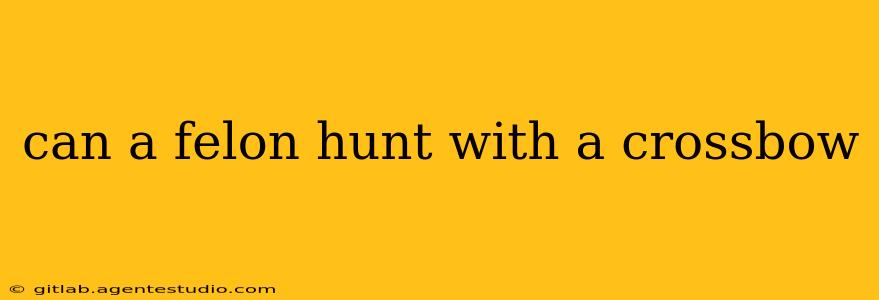Hunting is a cherished pastime for many, offering a connection to nature and a source of sustenance. However, for individuals with felony convictions, the question of whether they can participate in this activity, even with a seemingly less-lethal weapon like a crossbow, is fraught with legal complexities. The simple answer is: it depends. There's no single, nationwide answer; the legality hinges on various factors, including the specific state, the nature of the felony, and the applicable hunting regulations.
Understanding the Legal Landscape: State-Specific Regulations
The most crucial aspect to consider is that hunting laws are determined at the state level. Federal laws may address certain aspects of firearms ownership, but the specifics of hunting licenses and eligibility are largely under the purview of individual states. This means a felon might be able to hunt with a crossbow in one state but not in another.
To determine your eligibility, you must research your state's specific hunting regulations. These regulations are often available online through the state's Fish and Wildlife agency website. Look for information regarding:
- Felon hunting restrictions: These sections explicitly detail which felonies disqualify individuals from hunting and whether any exceptions or restoration of rights processes exist.
- License requirements: Even if felons are permitted to hunt, they may face stricter licensing requirements or need to undergo specific background checks.
- Weapon restrictions: While crossbows might seem less restrictive than firearms, some states might still prohibit their use by convicted felons, particularly if the underlying felony involves violence or weapons.
Beyond the State Level: The Nature of the Felony
The type of felony conviction significantly impacts hunting eligibility. States generally categorize felonies, and those involving:
- Violent crimes: Assault, battery, homicide, etc., are much more likely to lead to permanent hunting restrictions.
- Weapons offenses: Prior convictions related to firearms or other weapons dramatically increase the likelihood of hunting license denial.
- Drug-related offenses: Depending on the severity and specifics of the drug offense, restrictions may apply, though these are often less stringent than those related to violence or weapons.
Even within the same category, the specifics of the crime and sentencing will influence the outcome. For example, a conviction for felony assault resulting in serious injury would likely carry stricter penalties than a conviction for a less serious assault.
Restoring Hunting Rights: A Path to Participation
Some states offer pathways for restoring hunting rights after a felony conviction. These processes usually involve:
- Completion of parole or probation: Successfully completing the sentence is often a prerequisite.
- Petitioning the court: Individuals might need to petition the court for a restoration of rights, demonstrating rehabilitation and good behavior.
- Completion of specific programs: Some states may require participation in rehabilitation programs or community service to regain hunting privileges.
These processes vary significantly by state and can be complex. Seeking legal counsel is highly recommended to navigate this intricate process effectively.
Conclusion: Due Diligence is Crucial
The question of whether a felon can hunt with a crossbow necessitates a thorough investigation of state-specific hunting regulations and an understanding of the specific felony conviction. Don't assume; always verify. Contact your state's Fish and Wildlife agency directly, review the relevant statutes online, and, if necessary, consult with an attorney specializing in hunting regulations and criminal law. Failure to comply with hunting laws can result in significant fines and further legal repercussions. Prioritize legal compliance to ensure responsible and safe participation in the sport of hunting.

